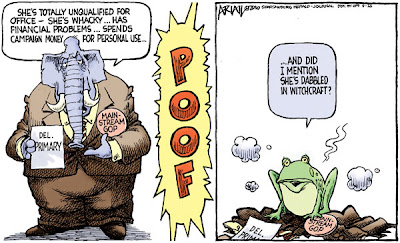
By Tony Phyrillas
Stop me if you've heard this one before: The Republican Party is the party of the rich. The Democratic Party represents working people.
That hogwash, perpetuated on behalf of Democratic candidates by rich and powerful labor unions and the equally rich and powerful elites who dominate the news media, has been an overriding theme in national elections for nearly a century.
Demonizing opponents makes for good politics, especially when you can pit "us" against "them." The problem with the "poor" vs. "rich" analogy is that it doesn't fit reality.
John Kerry, the 2004 Democratic Party nominee, was one of the richest men ever to seek the White House. With a personal fortune exceeding $200 million, Kerry wouldn't know a poor person if he stepped on him on his way to the country club. Kerry should have won the presidency against a George W. Bush weakened by unpopular wars in Iraq and Afghanistan, but he lost because he could not relate to the plight of most Americans.
Kerry is not alone. There are 237 millionaires currently serving in Congress, seven of them with net worths of more than $100 million each, according to the Center for Responsive Politics.
The three wealthiest members of the Senate are Sen. Herb Kohl (D-Wis.), worth about $215 million; Sen. Mark Warner (D-Va.), worth about $210 million; and Sen. Kerry (D-Mass.), worth about $209 million. Did you happen to notice the "D" after each of their names?
Among the 25 wealthiest lawmakers, including Speaker Nancy Pelosi (estimated worth of $32 million) — there are 14 Democrats and 11 Republicans, suggesting no clear wealth divisions between political parties, according to Political Hotsheet.
Democrat Barack Obama spent more money to win the presidency than any other candidate in U.S. history. Obama, a "community organizer" who worked his way up the Chicago political ladder, raised $750 million in 2008. That money wasn't sent to him $5 or $10 at a time by elderly grandmothers. It came from trial lawyers, labor unions, lobbyists and corporations.
Class warfare — pitting "us" against "them" or the "poor" versus the "rich" is among the most reliable tools in the Democratic Party's political arsenal, especially when your party has been in charge of Congress for the past four years and the White House for the past two years.
The result of Democratic leadership? Record unemployment, record home foreclosures and a record number of Americans in poverty.
Democrats can't run on their record of abject failure, so they need a diversion.
Take the closely-watched race for Senate in Pennsylvania, pitting Democrat Congressman Joe Sestak and Republican Pat Toomey.
Sestak's entire campaign so far has been to label Toomey as a "Wall Street insider," although Toomey has not worked on Wall Street since 1991. Unable to give voters any reason they should vote for Sestak, who has supported the Pelosi/Obama agenda 98 percent of the time, the Sestak campaign is working feverishly to paint Toomey as a real-life version of Gordon Gekko, the slimy corporate raider played by Michael Douglass in the two "Wall Street" films.
With the economy getting progressively worse under Democratic leadership (don't forget that Democrats took control of both houses of Congress four years ago) and polls showing a historic repudiation of the Democratic Party coming on Nov. 2, Democrats have fallen back on their favorite "rich vs. poor" campaign tactic.
Which brings us to the hottest debate in Washington, D.C., these days: Whether to extend the Bush tax cuts, enacted in 2001 and 2003, which are set to expire Dec. 31.
The Democrats keep saying the tax cuts benefited only the "rich" despite convincing evidence to the contrary.
While Americans earning more than $250,000 a year certainly benefited by the tax cuts, so did tens of millions of middle class Americans making less than $250,000.
Even the ultra-liberal and Democratic Party-friendly Washington Post admits that the Bush tax cuts have had a positive effect on the U.S. economy: "The cuts lowered tax rates across the board on income, dividends and capital gains; eventually eliminated the estate tax; further lowered burdens on married couples, parents and the working poor; and increased tax credits for education and retirement savings."
Obama wants to extend part of the Bush tax cuts, but not all of them, but Democrats do not appear to have the votes — or the nerve — to make a decision before Nov. 2. Senate Majority Leader Harry Reid announced last week he will postpone a vote on extending the Bush tax cuts until after the midterm elections.
While playing it safe politically may help Democrats, it does nothing for the fragile U.S. economy. The Democrats' unwillingness to make a move on taxes takes away incentive for consumers to spend and businesses to hire. And that's a big reason the recession shows no signs of letting up.
 Crime was down in Pennsylvania last year, which is somewhat of a surprise considering the state of the economy.
Crime was down in Pennsylvania last year, which is somewhat of a surprise considering the state of the economy.

























